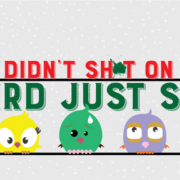Many of us are doing these things daily, and have no idea we are well on our way to ruining our relationships, because thankfully, we feel like its our partner’s fault.
1. Tell them “just calm down” or “get over it” when they are really upset.
2. Remind them of all the times they have failed you (ESPECIALLY when they least expect it, like when they are in the middle of a football game, or have just woken from a nap).
3. Tell them that they are just like having another child, and treat them that way too (phrases like “can you handle that small task?” and “I have to remind you a million times because I know you’ll forget!” are perfect).
4. Pretend you are going to do something they want you to do just to get them off your back, then don’t do it (while telling yourself that it’s really their fault you’re lying, I mean, come on, if they weren’t so needy and demanding you wouldn’t have had to lie!)
5. When they do something you asked them to, rather than thanking them, say things like “Well for once you followed through!” Tell yourself they won’t do it next time, its just a fluke. Stay cynical.
6. Don’t remind yourself, (or your spouse) what you know about real stresses and hardships in their life that make it hard for them to be the person they really want to be. You must act as though they could easily be pleasant and helpful and when they aren’t that way the only explanation is that they are SIMPLY CHOOSING not to.
7. Meditate on the idea that committed love is just a hoax, no one can really do it, people are too different, who wants one partner anyway? Think on your friend who’s been married 10 times. This must be proof. (DON’T think on the couples you know who somehow seem to be so close through the years, or deep yearnings in your heart to be known and accepted; keep that stuff pushed down!!)
8. Assume the worst – at all times! They most definitely purposefully forgot your birthday, just to hurt you; she’s bringing up that worry not because it is a real worry, but just because she likes to see you suffer.
9. Spend time wondering if you didn’t just choose the wrong person (rather than thinking about what you could do differently in the relationship). Focus on the idea that if you had just waited and married so-in-so, everything would be different, you’d have the life you want. Don’t let yourself think about how you felt about your partner in the beginning or factors that may have changed your relationship.
10. Never, I repeat NEVER consider your own role in your current struggles with your partner (especially not how you are so critical about the dishes, or how you tune them out every time they start talking about something they are worried about).
11. Above all, tell yourself you don’t really need them, what they do doesn’t effect you. You can leave any time and be fine.
Of course, if for any reason you’re interested in something else… something like a longer and healthier life; quicker recovery from physical and mental health problems; a significantly lowered chance of addiction; a more satisfied sex life; and a healthier next generation… if you’re interested in that, well, you might want to try something else.
(If you want to find out more about these claims about what a healthy relationship can do for you and how to do it, read Dr. Sue Johnson’s Love Sense.)
Emily Savage, M.MFT, LMFT-Associate










